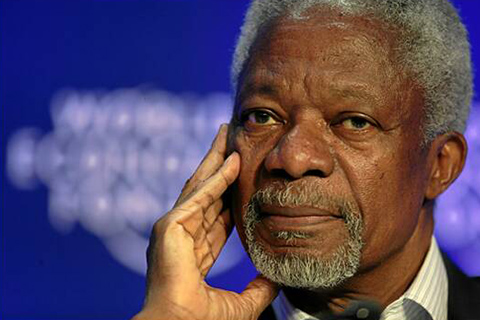
Today Humanity United mourns the loss of Kofi Annan, a bright light and a global  treasure.
treasure.
In a world where it seems loud and bullying leadership influences have all too often become the norm, Kofi Annan was a leader who embodied the power of quiet reflection and deep listening. And when he spoke, his was always a quiet and reasoned voice.
Speaking in Oslo after receiving the Nobel Peace Prize in 2001, then Secretary-General Annan said, “Today’s real borders are not between nations, but between powerful and powerless, free and fettered, privileged and humiliated. Today, no walls can separate humanitarian or human rights crises in one part of the world from national security crises in another.”
His words were a paragon for HU and foreshadowed the struggles the international community would experience in the 21st century.
After leaving as Secretary-General of the United Nations, he joined a group of esteemed stateswomen and men who were nearing the end of their public-facing careers yet were called into a more quiet and private service to humanity by Nelson Mandela. This group would become known as The Elders, dedicated to working for peace and human rights. Kofi was one of the founding members and, since 2013, Chair of The Elders.
He was also an advisor and friend to Humanity United and other humanitarian and human rights organizations. He introduced people of like-minds, built connections, and continued to be deeply engaged in preventing and responding to conflict and human rights abuses. His advice and kindness will not be forgotten.
We are so deeply saddened to have lost Kofi’s insights, counsel, and leadership. However, his values and vision live on in the generation of humanitarians, peacemakers, and leaders he has inspired—in Africa and around the world—and through his work at the U.N., The Kofi Annan Foundation, and with The Elders.
Above all, Kofi Annan was a champion of humanity. He believed in the value of all people and fought fiercely to protect them and advocate for them. His legacy is found in Humanity United’s work and that of many other humanitarian and human rights organizations around the world: to hope and to strive for a better and more peaceful future.
Photo copyright by World Economic Forum (www.weforum.org) [CC BY-SA 2.0 (https://creativecommons.org/licenses/by-sa/2.0)], via Wikimedia Commons